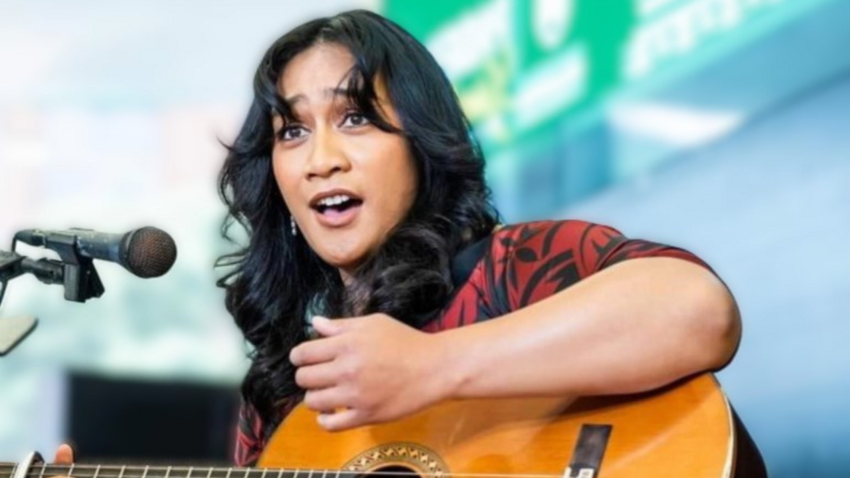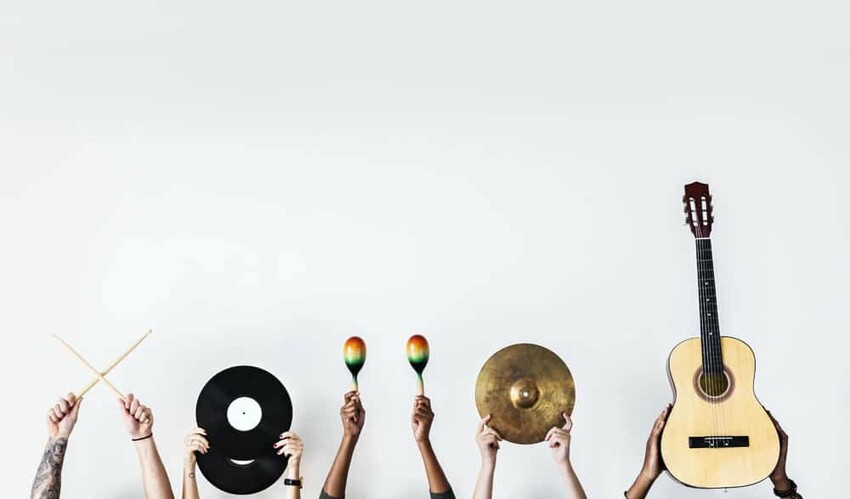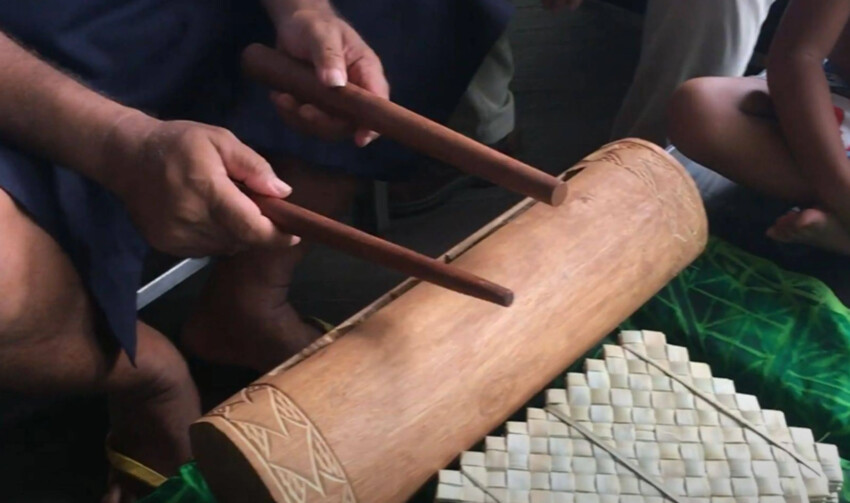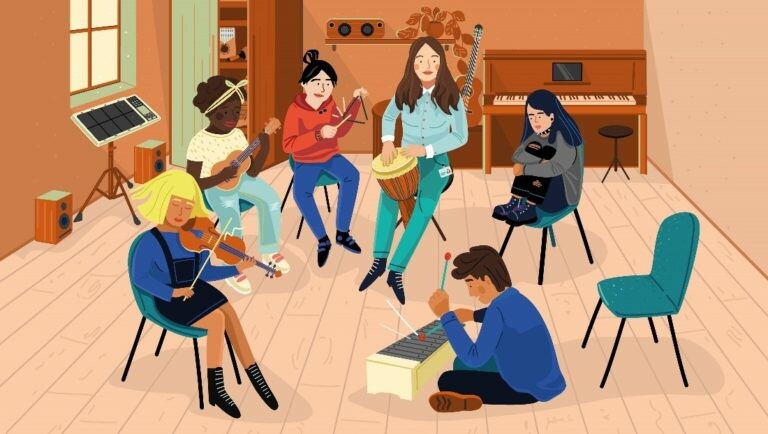WOMEN OF THE ISLANDS - JUNE POTIFARA

JUNE POTIFARA
MUSICAL THERAPIST
SAMOAN
-
This year, Music Therapy New Zealand celebrates a significant milestone: 50 years of music therapy practice in Aotearoa. Samoan Musical Therapist June Potifara shares more about her journey into the industry.
Could you please introduce yourself and your Pacific Heritage
Malo le soifua maua, ma le lagi e mamā. My name is June Potifara. I am of Samoan heritage, hailing from the villages of Falease’ela, Lefaga, and Sapunaoa, Falealili, but was born and nurtured here in Aotearoa. Therefore, I acknowledge the whenua and extend my gratitude to the tangata whenua whose mātauranga and tikanaga have enriched my upbringing.
Where did you grow up?
I grew up in the home of the brave, Otara in Tāmaki Makaurau. What I consider the heart of the Pacific, here in Aotearoa.
For those who don't know, could you please tell us about your work in Music Therapy?
My current work is within the disability and adult mental health sectors. I work with autistic students and students with multiple cognitive and physical disabilities who are between the ages of five to twenty one in a special school. Additionally, I work for an organization called Whakamatūtū which provides a six-week recovery-oriented therapeutic day programme for adults who are experiencing depressive disorder, anxiety, PTSD, and other common forms mental distress. This programme serves to provide support for the ‘missing middle’ in the mental health system here in Aotearoa.
In general, music therapists often work as members of a clinical team in a various settings and diverse spaces such as schools, rehabilitation centres, aged care, mental health facilities, and hospitals. Some work in private practice in homes or clinics. To briefly explain what music therapy is; it is the planned use of music to assist with the healing and growth of people(s) with identified emotional, intellectual, physical, spiritual, and social needs. Music therapy plans and sessions are tailored to groups and individuals’ unique needs. It weaves creativity and clinical methodology that is guided by extensive research and evidence-based practices.

Why do you think Music Therapy is important for communities to look into?
I think music therapy is valuable for communities and important to look into as it supports multiple sectors beyond mental health. In healthcare, it supports various recovery plans alongside pain relief. In education, it enhances learning and supports various areas of a student’s learning journey. In aged care, it promotes cognitive stimulation and aims to improve quality of life. Additionally, it can be used in rehabilitation, disability support, and even in corporate environments to reduce stress and improve team collaboration. For our LGBTQ+ community, it can foster a safe, affiirming space for self-expression and emotional support. All in all, music therapy’s broad impact strengthens community well-being, resilience, and inclusivity.
Music/Dance/Siva are tools that Pacific People use to stay rooted in their cultures and thus themselves as people. Do you believe that Music Therapy can do the same for the Western world?
Absolutely! Music therapy has the potential to offer similar benefits in the Western world as music, siva, and other cultural practices do for Pacific Peoples. While the contexts and cultural practices may differ, in the Western context, it can play a crucial role in enhancing emotional well-being, facilitating self expression, and reinforcing personal and cultural identity. Music therapy can be adapted to various cultural contexts, making it a versatile approach that can integrate and honour diverse cultural backgrounds and traditions.
How has your Pacific Heritage affected the way you operate in your industry/mahi?
My Samoan/Pasifika heritage has enriched my music therapy practice by providing a culturally grounded framework that honours our Pacific traditions, fosters connection, and promotes holistic well-being. In my work, I weave in our Pasifika worldviews that emphasize physical, mental, emotional, and spiritual health, aligning with indigenous healing practices. I carry a deep respect for cultural traditions, values, and ways of being. Working through this lens, has encouraged me to practice with respect, sensitivity, and understanding. Concurrently, I advocate for cultural resilience and social justice within therapeutic settings and strive to create spaces that validate diverse cultural experience, whilst challenging systemic inequalities. The way I strive to operate in my practice illuminates indigenous healing practices that view health as interconnected and multifaceted.

In what ways do you believe our health system would benefit from using Music Therapy?
Similarly to my response to an earlier question about why communities should look into music therapy, I believe our health system could benefit from using music therapy as it promotes holistic, patient centered care and enhances overall health outcomes. In relation to Mason Duries Te Whare Tapa Whā model, music therapy weaves and addresses physical, mental, emotional, and spiritual that aids in balancing patients’ overall health and wellbeing. When all these things are in balance, we thrive.
What advice would you give those who wanted to learn more about Music Therapy?
Seek to understand with an open mind and heart.
In saying this, we welcome all to come join us from the 13th-15th of September in Te-Whanganui-a-Tara for Music Therapy New Zealand’s 50th Anniversary Conference. Here you will be able to hear from several music therapists talanoa about their diverse and evolving work and research throughout Aotearoa, and around the globe. There is a lot of information that can be found on Music Therapy New Zealand’s website.

How can people access Music Therapy?
People can access music therapy through various channels. Referrals can be made by healthcare professionals, schools, or community organisations. Music therapists often work in hospitals, rehabilitation centres, aged care facilities, schools, special education settings, and private practices. You can also contact Music Therapy New Zealand or visit their website for a list of music therapists or visit local health services that may oƯer music therapy programs.
What/Who inspires you in your work?
My family, cultural heritage, and my own life experiences which led me to finding solace within music. There is a beautiful Maori whakatauki (proverb) that encompasses the driving force for my mahi. The whakatauki is:
'He aha te mea nui tea o? He tangata he tangata, he tangata!'
What is the most important thing in the world? It is people it is people it is people!
-
By Tikilounge Productions & Creative New Zealand Toi Aotearoa
